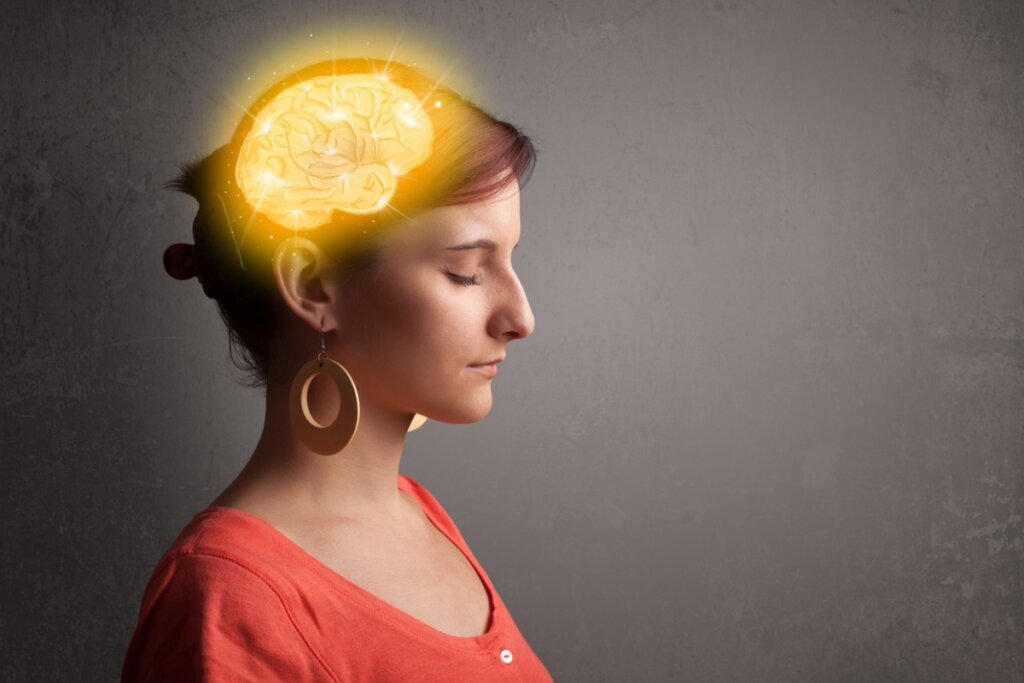The Link Between Emotional Intelligence and Critical Thinking


Written and verified by the psychologist Valeria Sabater
What’s the first thing that comes to mind when you hear the term critical thinking? You probably associate this ability with observation, analysis, judgment, reflection, and questioning. Indeed, it’s usually linked with the more analytical and rational, not the world of emotions or emotional intelligence.
However, it’d be extremely difficult to apply critical thinking if you didn’t also adequately deal with your complex emotional universe. That said, this could be your biggest challenge. Moreover, it explains in part the suffering of today’s society as far too many people have hectic and hyperconnected lives.
In fact, the constant pressure of the environment, and being surrounded by stimuli mean you experience problems in the art of emotional regulation. Immediacy dominates you. But, in this thorny context, your mind wanders, your attention scatters, and it’s almost impossible to think critically when stress and anxiety are filtering everything around you.
For this reason, it’s important to work on the following two pillars of well-being and human potential: emotional intelligence and critical thinking.
Knowing how to regulate your emotions is decisive for critical thinking.

The link between emotional intelligence and critical thinking
Critical thinking is a more disciplined way of reasoning. It’s oriented toward analysis, active evaluation, and reflection on the information you receive. Unquestionably, it’s a pretty scientific approach. As a result, it’s common to make the mistake of assuming that this highly sophisticated cognitive process doesn’t include any emotional aspects.
It’s inevitable that you turn off your emotions when analyzing your reality. In fact, you may turn off all your cognitive biases. However, you do need to be aware of the impact of critical thinking and emotional intelligence on your way of thinking. You also need to know how to regulate them. That’s extremely important.
A study conducted by the University of Florida (USA) claims that critical thinking facilitates and promotes a more rational and balanced emotional life. Furthermore, these two dimensions orchestrate good leadership.
In effect, emotional intelligence and critical thinking feed each other. So much so that, by working on one, you lay the foundations for the development of the other. Let’s find out why.
You tend to think that your emotions and thoughts (heart and brain) are two separate entities. Yet, both make up the same two-way highway.
1. Self-awareness: controlled emotions and thoughts
Emotional intelligence empowers you with a decisive tool: emotional self-awareness. Thanks to this competence, you better understand your internal states and have control over them. An individual with deficiencies in this area thinks and acts driven by impulsiveness, by difficult emotions that aren’t regulated.
Therefore, someone who isn’t too good at recognizing their own state of mind will have trouble applying effective thinking. Sometimes, it could be due to an underlying anxiety that completely conditions their decisions. As a matter of fact, Daniel Goleman defined emotional self-awareness as the cornerstone of emotional intelligence for this reason.
2. Self-regulation for controlling impulsive thinking
One of the biggest enemies of critical thinking is impulsiveness. Thinking fast, as Daniel Kahneman would put it, or on autopilot, prevents you from carrying out all those processes that simplify being able to execute a more critical and analytical approach. Indeed, it’s difficult to reflect, meditate, or compare information when your mind skips through the steps and you get carried away by haste and action-reaction.
Emotional intelligence and critical thinking are directly linked by self-regulation. Not allowing yourself to be driven by your emotions but making contact with them beforehand in order to understand and regulate them, is important.
After all, you think much better if you’re not feeling frustrated. You also analyze information or a situation in an optimal way when stress or anger isn’t clouding your judgment.
Thanks to emotional intelligence, you make use of good communication and empathy. This is essential if you want to possess more information about the environment and think critically.
3. Critical thinking and social skills
Have you ever wondered how empathy and good emotional communication influence critical thinking? In reality, they’re extraordinarily useful for personal development. Emotional intelligence and critical thinking are linked via social skills.
If you listen to others in an open, empathetic way and through effective communication, you obtain more information for thinking critically. It means having more variables to decide. It involves developing an open and flexible mind that takes into account information that challenges your beliefs.
4. Motivation for solving problems
When making a reasoned judgment, you’ll always experience a certain series of emotions. These are psychophysiological states of positive valence. You also articulate them through another star performer in emotional intelligence: motivation.
Motivated behavior feeds on curiosity, determination, confidence, and inspiration. Excluding these extremely energetic states would completely hinder you in solving problems and making decisions. To think critically, you require a motivated mind that’s capable of regulating your negative emotional states and reasoning effectively.
Emotional intelligence and critical thinking are like a two-way bridge and each process uses self-motivation as gear. Thanks to this dimension, you focus your attention on what’s most important, without distractions. In addition, it’s a decisive element that appeases frustration and facilitates agile and dynamic thinking.

Conclusion
As a society, we need to become far more literate in these two life and well-being skills. As a matter of fact, emotional intelligence and critical thinking are a couple of dimensions that should be present in the school curriculum of every child and adolescent.
Indeed, knowing our own emotions, regulating them, and thinking critically improves the psychological well-being and psychosocial development of all of us. After all, in an increasingly chaotic world, dominated by social media, fake news, the tyranny of the image, and excessive demand, we require essential tools to navigate our daily lives.
Fortunately, it’s never too late to enable ourselves in these exceptional psychological skills. Why not start today?
What’s the first thing that comes to mind when you hear the term critical thinking? You probably associate this ability with observation, analysis, judgment, reflection, and questioning. Indeed, it’s usually linked with the more analytical and rational, not the world of emotions or emotional intelligence.
However, it’d be extremely difficult to apply critical thinking if you didn’t also adequately deal with your complex emotional universe. That said, this could be your biggest challenge. Moreover, it explains in part the suffering of today’s society as far too many people have hectic and hyperconnected lives.
In fact, the constant pressure of the environment, and being surrounded by stimuli mean you experience problems in the art of emotional regulation. Immediacy dominates you. But, in this thorny context, your mind wanders, your attention scatters, and it’s almost impossible to think critically when stress and anxiety are filtering everything around you.
For this reason, it’s important to work on the following two pillars of well-being and human potential: emotional intelligence and critical thinking.
Knowing how to regulate your emotions is decisive for critical thinking.

The link between emotional intelligence and critical thinking
Critical thinking is a more disciplined way of reasoning. It’s oriented toward analysis, active evaluation, and reflection on the information you receive. Unquestionably, it’s a pretty scientific approach. As a result, it’s common to make the mistake of assuming that this highly sophisticated cognitive process doesn’t include any emotional aspects.
It’s inevitable that you turn off your emotions when analyzing your reality. In fact, you may turn off all your cognitive biases. However, you do need to be aware of the impact of critical thinking and emotional intelligence on your way of thinking. You also need to know how to regulate them. That’s extremely important.
A study conducted by the University of Florida (USA) claims that critical thinking facilitates and promotes a more rational and balanced emotional life. Furthermore, these two dimensions orchestrate good leadership.
In effect, emotional intelligence and critical thinking feed each other. So much so that, by working on one, you lay the foundations for the development of the other. Let’s find out why.
You tend to think that your emotions and thoughts (heart and brain) are two separate entities. Yet, both make up the same two-way highway.
1. Self-awareness: controlled emotions and thoughts
Emotional intelligence empowers you with a decisive tool: emotional self-awareness. Thanks to this competence, you better understand your internal states and have control over them. An individual with deficiencies in this area thinks and acts driven by impulsiveness, by difficult emotions that aren’t regulated.
Therefore, someone who isn’t too good at recognizing their own state of mind will have trouble applying effective thinking. Sometimes, it could be due to an underlying anxiety that completely conditions their decisions. As a matter of fact, Daniel Goleman defined emotional self-awareness as the cornerstone of emotional intelligence for this reason.
2. Self-regulation for controlling impulsive thinking
One of the biggest enemies of critical thinking is impulsiveness. Thinking fast, as Daniel Kahneman would put it, or on autopilot, prevents you from carrying out all those processes that simplify being able to execute a more critical and analytical approach. Indeed, it’s difficult to reflect, meditate, or compare information when your mind skips through the steps and you get carried away by haste and action-reaction.
Emotional intelligence and critical thinking are directly linked by self-regulation. Not allowing yourself to be driven by your emotions but making contact with them beforehand in order to understand and regulate them, is important.
After all, you think much better if you’re not feeling frustrated. You also analyze information or a situation in an optimal way when stress or anger isn’t clouding your judgment.
Thanks to emotional intelligence, you make use of good communication and empathy. This is essential if you want to possess more information about the environment and think critically.
3. Critical thinking and social skills
Have you ever wondered how empathy and good emotional communication influence critical thinking? In reality, they’re extraordinarily useful for personal development. Emotional intelligence and critical thinking are linked via social skills.
If you listen to others in an open, empathetic way and through effective communication, you obtain more information for thinking critically. It means having more variables to decide. It involves developing an open and flexible mind that takes into account information that challenges your beliefs.
4. Motivation for solving problems
When making a reasoned judgment, you’ll always experience a certain series of emotions. These are psychophysiological states of positive valence. You also articulate them through another star performer in emotional intelligence: motivation.
Motivated behavior feeds on curiosity, determination, confidence, and inspiration. Excluding these extremely energetic states would completely hinder you in solving problems and making decisions. To think critically, you require a motivated mind that’s capable of regulating your negative emotional states and reasoning effectively.
Emotional intelligence and critical thinking are like a two-way bridge and each process uses self-motivation as gear. Thanks to this dimension, you focus your attention on what’s most important, without distractions. In addition, it’s a decisive element that appeases frustration and facilitates agile and dynamic thinking.

Conclusion
As a society, we need to become far more literate in these two life and well-being skills. As a matter of fact, emotional intelligence and critical thinking are a couple of dimensions that should be present in the school curriculum of every child and adolescent.
Indeed, knowing our own emotions, regulating them, and thinking critically improves the psychological well-being and psychosocial development of all of us. After all, in an increasingly chaotic world, dominated by social media, fake news, the tyranny of the image, and excessive demand, we require essential tools to navigate our daily lives.
Fortunately, it’s never too late to enable ourselves in these exceptional psychological skills. Why not start today?
All cited sources were thoroughly reviewed by our team to ensure their quality, reliability, currency, and validity. The bibliography of this article was considered reliable and of academic or scientific accuracy.
- Andenoro., A. Stedman, N. (2007). Identification of Relationships between Emotional Intelligence Skill & Critical Thinking Disposition in Undergraduate Leadership Students. The Journal of Leadership Education, 6(1). https://journalofleadershiped.org/jole_articles/identification-of-relationships-between-emotional-intelligence-skill-critical-thinking-disposition-in-undergraduate-leadership-students/
- Berthet, V. (2021). The Impact of Cognitive Biases on Professionals’ Decision-Making: A Review of Four Occupational Areas. Front. Psychol, 12. https://www.frontiersin.org/articles/10.3389/fpsyg.2021.802439/full
- Chauhan, Richa. (2016). Role of Emotional Intelligence in Decision Making. SSRN Electronic Journal. 10.2139/ssrn.2797345.
- Hasanpour, M., Bagheri, M., & Ghaedi Heidari, F. (2018). The relationship between emotional intelligence and critical thinking skills in Iranian nursing students. Medical journal of the Islamic Republic of Iran, 32, 40. https://doi.org/10.14196/mjiri.32.40
- Madadkhani, N., Nikoogoftar, M. (2015). Critical Thinking in Nurses: Predictive Role of Emotional Intelligence. Journal of Hayat, 20(4). https://hayat.tums.ac.ir/browse.php?a_id=974&sid=1&slc_lang=en
- Pishghadam R. Enhancing critical thinking with literary discussion. Journal of Literary Studies. 2008;40(159):154–75
This text is provided for informational purposes only and does not replace consultation with a professional. If in doubt, consult your specialist.







